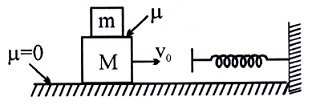Q.
A block of mass $M$ slides on a frictionless surface with an initial speed of $v_{0}$ . On top of the block, there is a small block of mass $m$ . The coefficient of friction between the blocks is $\mu $ . The system of blocks encounters an ideal spring with force constant $k$ . The maximum value of $k$ for which the blocks don't slip relative to each other is

NTA AbhyasNTA Abhyas 2020Work, Energy and Power
Solution: